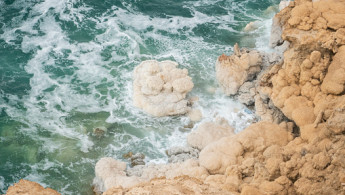Jordan moves forward with ‘Dead to Red’ water mega project
Jordan announced on Thursday that it has submitted a tender for the “Aqaba-Amman water carrier project”, which will provide 300 million cubic meters of water to the Kingdom once finished.
The Ministry of Water and Irrigation (MWI) sent the request to five “prequalified consortiums” which will prepare bids for the project, according to the national news agency. The project is expected to be finished in 2027, and estimates of its cost range from $2.8 billion to $10 billion.
The Aqaba-Amman water carrier project, also known as the “Dead to Red,” is a massive infrastructural project which would carry water from the Red Sea to the Dead Sea, over a total distance of 450 kilometres. Water would be taken from the sea, and desalinised at the port of Aqaba. Freshwater would then be sent via one pipe and saltwater brine via another, to the Dead Sea.
The freshwater would be sent on to the capital city of Amman, while the brine would be fed to the Dead Sea, helping restore the lake’s declining water level. Israel and Palestine would also receive some water from the project.
A feasibility study for the project was first commissioned in 2005, but the project has stalled since due to foot-dragging from both the Jordanians and the Israelis. A call for bids is the most notable step forward that the project has seen in years.
As the second most water-scarce country in the world, Jordan is in particular need of the project. Jordanian PM Bisher Khasawneh said in a speech on Wednesday that annual per capita share of water in the country is about 90 cubic metres; the UN considers the “water poverty line” to be 500 cubic metres.
A punishing drought this summer severely depleted the country’s reserve of water meant for agriculture, with six of Jordan’s seventeen dams drying up in early November. The country relies heavily on underground aquifers for its drinking water supply, which is a non-renewable source.
Jordan signed a declaration of intent with an Emirati company on 22 November to build a solar power farm in the country’s south. The solar power would be sent to Israel in exchange for desalinated water. Proponents of the deal have described it as “water for peace,” and US Climate Change Envoy John Kerry was in attendance when it was signed.
The deal has encountered widespread opposition in Jordan, where the population – up to 80 percent of which is of Palestinian origin – has condemned the deal for “normalising” Israel. Thousands of Jordanians turned out to protest the deal, and dozens were arrested for doing so – though eventually all were released.
Parliamentarians have also voiced their opposition to the deal, to little avail. In his address to Parliament on Wednesday, Khasawneh warned parliamentarians that the Dead to Red project is “irreversible” and is “interrelated, simultaneous and interdependent” with the Jordan-UAE-Israel water and solar deal.
He added that “One … cannot be implemented without the other.”
The New Arab contacted the MWI for this article, but received no response at the time of publishing.





 Follow the Middle East's top stories in English at The New Arab on Google News
Follow the Middle East's top stories in English at The New Arab on Google News


